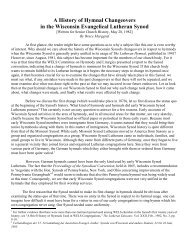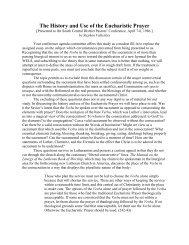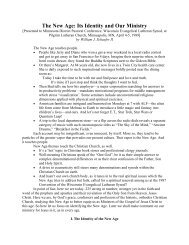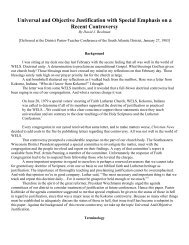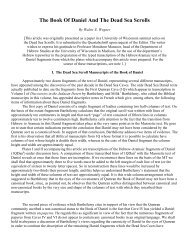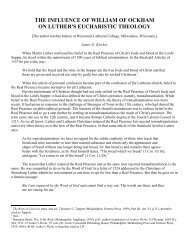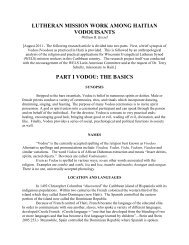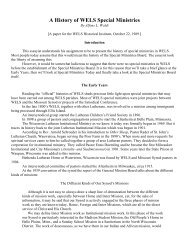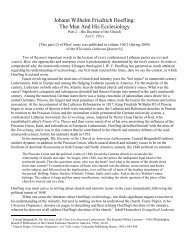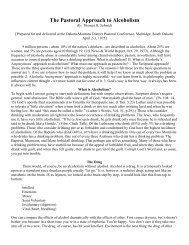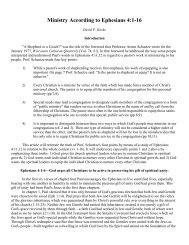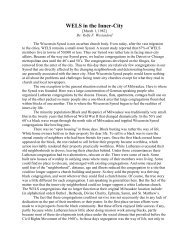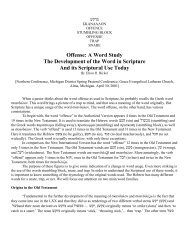Strangers to Sisters - Wisconsin Lutheran Seminary Library: Essays
Strangers to Sisters - Wisconsin Lutheran Seminary Library: Essays
Strangers to Sisters - Wisconsin Lutheran Seminary Library: Essays
Create successful ePaper yourself
Turn your PDF publications into a flip-book with our unique Google optimized e-Paper software.
Bethany <strong>Lutheran</strong> College and the Evangelical <strong>Lutheran</strong> Synod on the other. The first<br />
skirmishes of the “Manka<strong>to</strong> War” broke out at Immanuel. Even though the original<br />
members of Our Savior’s had promised that they would be reaching out <strong>to</strong> non-Synodical<br />
Conference members, their ranks swelled with 180 transfers in the first few months<br />
alone. This was <strong>to</strong> a certain extent expected. All such transfers had been done in good<br />
order and with sisterly love, at least on the surface. But all it <strong>to</strong>ok for hostilities <strong>to</strong><br />
commence was one slip at a morning service by Pas<strong>to</strong>r Fischer.<br />
Pas<strong>to</strong>r Adolph Ackermann, the senior pas<strong>to</strong>r at Immanuel, had died early Sunday<br />
morning and by service time, many of the members had already known 293 . However, as is<br />
293 Adolph Ackermann (1871-1950) had a his<strong>to</strong>ry of controversy within the Minnesota Synod and later,<br />
Minnesota District. Ackermann was a gifted preacher, teacher and administra<strong>to</strong>r and was a professor (1894-<br />
1918) and later president of DMLC (1914-1918). But his pro-Germany, anti-draft public comments led <strong>to</strong><br />
officials of both the church and the state <strong>to</strong> pressure him in<strong>to</strong> resigning his position. He begrudgingly<br />
acquiesced <strong>to</strong> their request, leaving office with the final words of protest, “Recht muss Recht bleiben!” -<br />
What is right is right!” (Fredrich, pg 283). Following his resignation, he <strong>to</strong>ok a call <strong>to</strong> a small, dual parish<br />
in Essig-Brigh<strong>to</strong>n, Minnesota. In 1922, he received a call <strong>to</strong> serve as pas<strong>to</strong>r of Immanuel <strong>Lutheran</strong> Church,<br />
Manka<strong>to</strong>, MN.<br />
In 1936 he had been elected as district president of the Minnesota District, and served until 1948,<br />
when he was replaced by Oscar Naumann. Following Naumann’s election <strong>to</strong> the district presidency,<br />
Ackermann rebuked the body for not re-electing him and then left the chair and the convention. Naumann’s<br />
election was seen by many as a move by the district <strong>to</strong> take a stronger stand against the LCMS divergence<br />
in doctrine and practice, for Ackermann had been considered <strong>to</strong> have liberal and unionistic tendencies.<br />
George Schweikert, in a letter of congratulations <strong>to</strong> Oscar Naumann on his election, confirms this fact<br />
when he writes, “Congratulations on being elected <strong>to</strong> the presidency of the Minnesota District…I had a few<br />
notes on your election that I had planned <strong>to</strong> insert in the current issue of the Okabena <strong>Lutheran</strong>, but the<br />
space ran out on me <strong>to</strong>o soon. Also, it is rather hard <strong>to</strong> handle some news. Should I take a crack at Pas<strong>to</strong>r<br />
Ackermann? He might use that as further reason for leaving us, i.e., the Conservatives. Anyway, he is out<br />
and you are in the office thru which you can do much as a defender of the faith.” (George Schweikert <strong>to</strong><br />
Oscar Naumann, letter, June 30, 1948, Minnesota District Presidential Files – Ackermann Correspondence,<br />
<strong>Wisconsin</strong> <strong>Lutheran</strong> <strong>Seminary</strong> Archives, Mequon, WI).<br />
The chief complaint of Schweikert and others against Ackermann was his willingness <strong>to</strong> give in <strong>to</strong><br />
liberal practice either by ignoring protests or making excuses that glossed over the real issue. For instance,<br />
Ackermann, much <strong>to</strong> the surprise of Pas<strong>to</strong>r Fischer, had allowed a young man <strong>to</strong> join the church and attend<br />
the Lord’s Supper even though he had signed a contract with the local Catholic priest <strong>to</strong> raise his children<br />
Catholic. Even more disturbing was the fact that in the 28 years that Ackermann had been pas<strong>to</strong>r, Immanuel<br />
had never excommunicated anyone, but simply dropped names from the church roster. Pas<strong>to</strong>r Gervasius<br />
Fischer arrived as the associate pas<strong>to</strong>r of Immanuel in 1949. It seems that from his very arrival, he s<strong>to</strong>od in<br />
stark contrast <strong>to</strong> Ackermann lax attitude <strong>to</strong>ward the divergences in the LCMS. An exasperated Fischer<br />
wrote, “Every confessional stand of mine is a widening of the breech. Ackermann stands on the liberal side<br />
of the gap and I on the other.” (Gervasius Fisher <strong>to</strong> Oscar Naumann, letter, December 11, 1949, The<br />
Manka<strong>to</strong> Case Files, <strong>Wisconsin</strong> <strong>Lutheran</strong> <strong>Seminary</strong> Archives, Mequon, WI). Of wider concern <strong>to</strong> the other<br />
WELS and ELS churches of the Manka<strong>to</strong> area was Ackermann’s involvement with the Manka<strong>to</strong> Ministerial<br />
157



